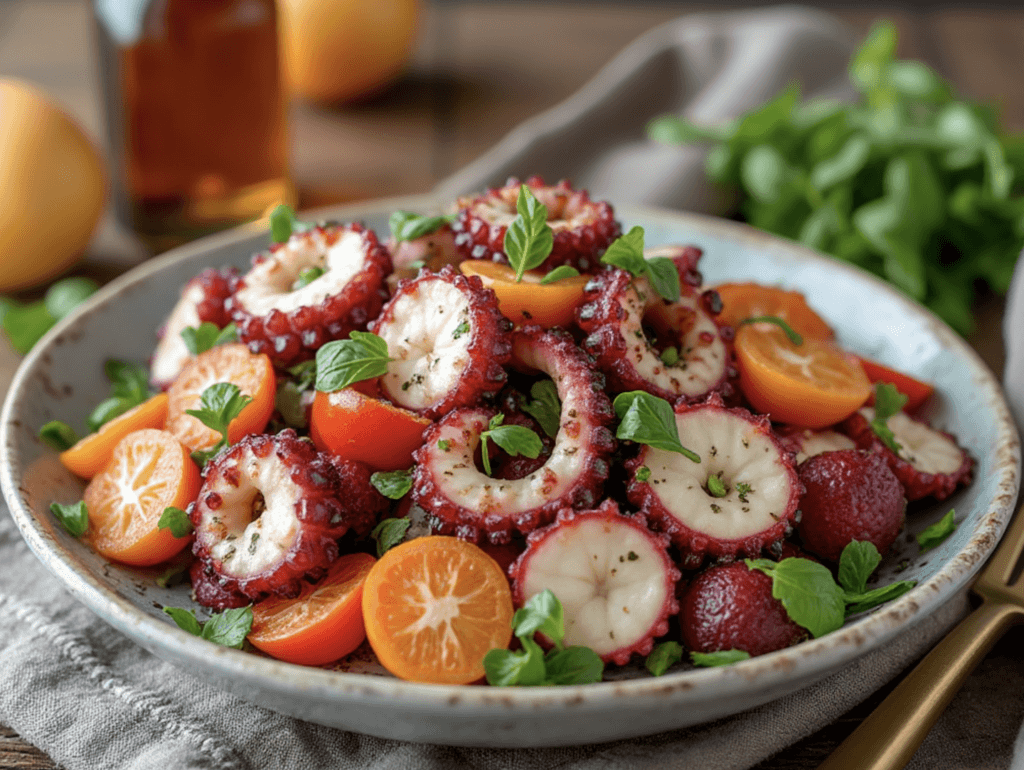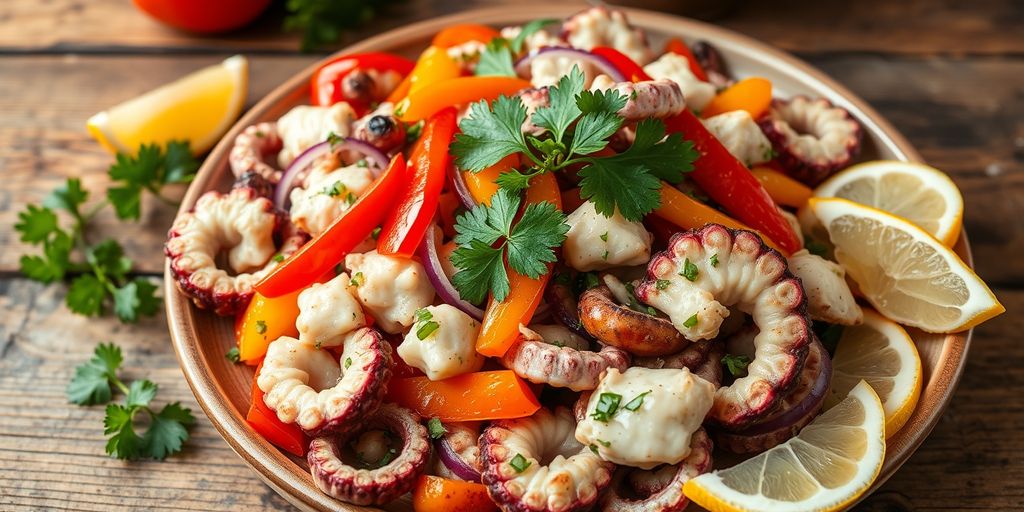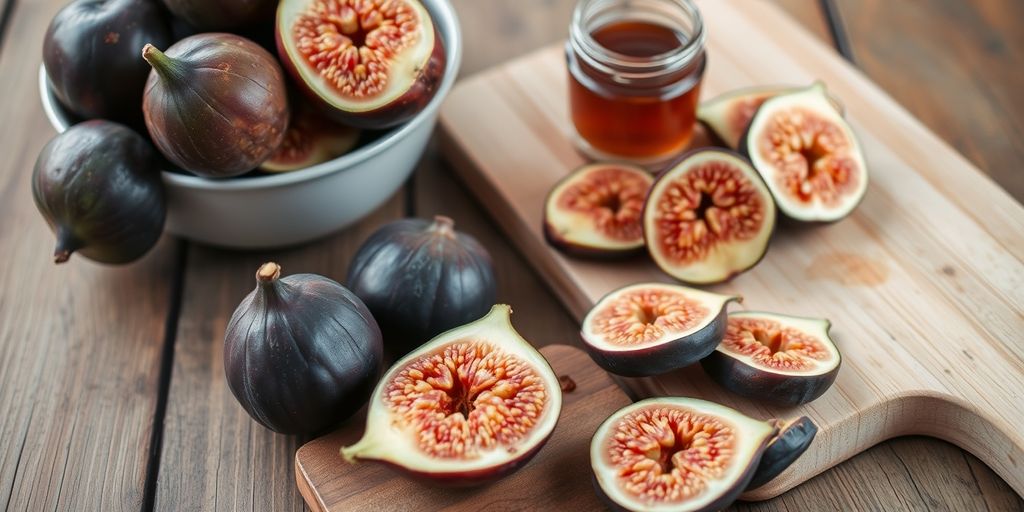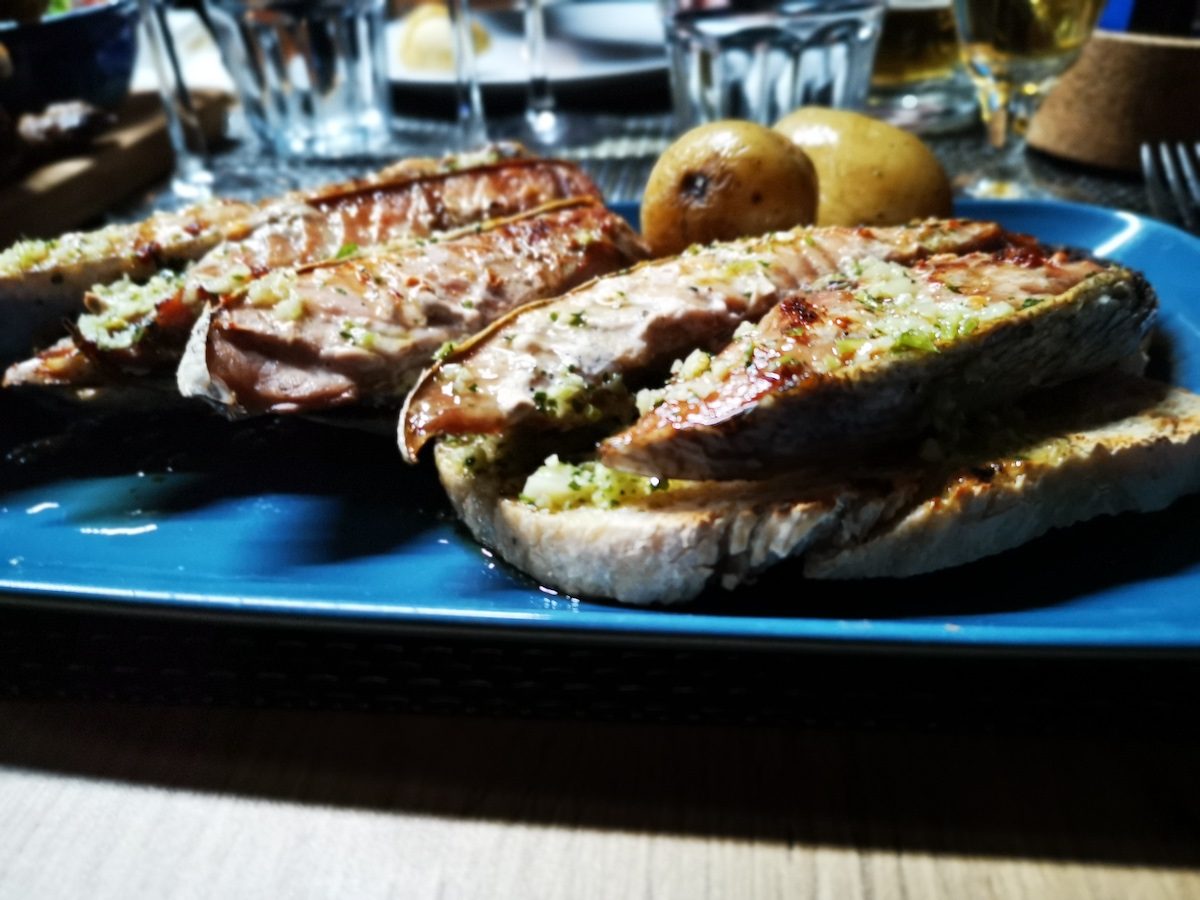Selecting the Right Octopus

Choosing the right octopus is crucial for making a delicious Portuguese octopus salad. Here are some tips to help you make the best choice.
Fresh vs. Frozen Octopus
When it comes to octopus, you can choose between fresh and frozen. Fresh octopus is often preferred for its texture and flavor, but frozen octopus can be just as good if it’s properly handled. In fact, freezing can help tenderize the octopus, making it easier to cook.
Where to Buy Quality Octopus
You can find quality octopus at seafood markets, specialty stores, and even some grocery stores. Look for octopus that is firm to the touch and has a mild, ocean-like smell. Avoid any that have a strong, fishy odor.
Tips for Cleaning Octopus
Cleaning octopus can be a bit tricky, but it’s an important step. Start by rinsing the octopus under cold water. Remove the beak and the ink sac, if present. Some people also like to remove the skin, but this is optional. Once cleaned, your octopus is ready to be cooked.

Essential Ingredients for Portuguese Octopus Salad
To make a delicious Portuguese octopus salad, you’ll need a variety of fresh ingredients. These ingredients not only add flavor but also bring out the best in the octopus. Here’s a breakdown of what you’ll need:
Vegetables and Herbs
- Onions: Thinly sliced onions add a bit of crunch and a mild, sweet flavor.
- Tomatoes: Fresh tomatoes provide a juicy and slightly tangy taste.
- Bell Peppers: Use a mix of red, yellow, and green bell peppers for color and sweetness.
- Garlic: A couple of cloves of garlic will enhance the overall flavor.
- Fresh Herbs: Cilantro and parsley are commonly used, but you can also add fresh thyme and rosemary for extra aroma.
Olive Oil and Vinegar
- Extra Virgin Olive Oil: This is a key ingredient in Portuguese cuisine. It adds richness and depth to the salad.
- White Wine Vinegar: This vinegar adds the necessary acidity to balance the richness of the olive oil and the sweetness of the vegetables.
Seasonings and Spices
- Salt and Black Pepper: Essential for seasoning the salad to taste.
- Bay Leaf: Adds a subtle, earthy flavor when cooking the octopus.
- Paprika and Chili Powder: These spices add a bit of heat and smokiness to the dish.
By using these key ingredients, you can create a flavorful and authentic Portuguese octopus salad that will impress your guests. Remember, the quality of the ingredients can make or break the dish, so always opt for the freshest options available.
Preparing the Octopus
Boiling Method
- Clean the octopus thoroughly under cold water. Remove the beak and eyes if not already done.
- Fill a large pot with water and bring it to a boil. Add aromatic ingredients like bay leaves, garlic, and onion to enhance the flavor.
- Tenderize the octopus by dipping it in and out of the boiling water a few times before fully submerging it. This helps to break down the muscle fibers.
- Boil the octopus for about 45-55 minutes, depending on its size. Check for tenderness by piercing it with a fork.
- Once tender, remove the octopus from the pot and let it cool. Save the broth for other seafood dishes if desired.
Roasting Method
- Preheat your oven to 375°F (190°C).
- Place the cleaned octopus on a baking tray with sliced onions, tomatoes, and garlic. Add fresh herbs like rosemary and thyme.
- Cover the tray with foil and roast for about an hour. The cooking time may vary based on the size of the octopus.
- After roasting, strain the stock and save it for future use. Let the octopus cool before cutting it into bite-sized pieces.

Tenderizing Tips
- Dipping Method: As mentioned, dipping the octopus in and out of boiling water helps tenderize it.
- Freezing: If you bought a fresh octopus, freezing it overnight can also help break down the muscle fibers, making it more tender when cooked.
- Beating: Although not commonly practiced today, some traditional methods involve beating the octopus with a rolling pin to soften it up.
By following these steps, you’ll ensure your octopus is perfectly tender and ready for your Portuguese-style salad.
Making the Dressing
Balancing Flavors
Creating the perfect dressing for your Portuguese octopus salad is all about balancing flavors. You want a mix of tangy, salty, and a bit of heat. Start with a good quality olive oil as your base. Add freshly squeezed lemon juice or vinegar for acidity. Don’t forget to season with salt and pepper. If you like a bit of spice, a pinch of red pepper flakes can do wonders.
Choosing the Right Olive Oil
The olive oil you choose can make or break your dressing. Always go for high-quality, extra-virgin olive oil. It adds a rich, fruity flavor that complements the octopus and other ingredients. Avoid using light or pure olive oil as they lack the depth of flavor needed for this dish.
Adding Acidity with Vinegar
Acidity is crucial for a well-rounded dressing. You can use lemon juice, but red wine vinegar is a traditional choice in Portuguese cuisine. It adds a sharp, tangy note that balances the richness of the olive oil and the natural sweetness of the octopus. Feel free to adjust the amount to suit your taste, but remember, a little goes a long way.
Combining Ingredients
Chopping Vegetables
Start by chopping all the vegetables. This includes bell peppers, onions, and parsley. Make sure to chop them into small, even pieces so they mix well with the octopus.
Mixing Techniques
Once your vegetables are chopped, it’s time to mix them with the octopus. Use a large bowl to combine everything. Gently fold the ingredients together to avoid breaking the octopus pieces.
Marinating Time
After mixing, let the salad marinate. This step is crucial for the flavors to meld together. Ideally, you should let it sit in the fridge for at least an hour before serving. This will allow the flavors to fully develop and make your salad even more delicious.
Serving Suggestions

Ideal Side Dishes
When serving Portuguese octopus salad, consider pairing it with roasted or boiled potatoes. These sides complement the flavors of the octopus perfectly. Additionally, a fresh green salad or some crusty bread can make the meal more satisfying.
Pairing with Wines
A crisp white wine, such as Vinho Verde, is an excellent choice to accompany your octopus salad. The light and refreshing taste of this wine enhances the dish’s flavors. Alternatively, a dry rosé can also be a good match.
Presentation Tips
For a beautiful presentation, arrange the octopus salad on a large platter. Garnish with lemon wedges and a sprinkle of fresh parsley. This not only adds color but also a burst of freshness. Remember, a well-presented dish can make the dining experience more enjoyable.
Variations of Portuguese Octopus Salad
Portuguese octopus salad is a versatile dish that can be customized in many ways. Here are some popular variations you might want to try:
Adding Seafood
To make your octopus salad even more delightful, consider adding other types of seafood. Prawns and mussels are excellent choices that blend well with the flavors of octopus. Simply cook them separately and mix them into your salad for an extra layer of taste and texture.
Incorporating Legumes
Legumes like chickpeas or white beans can add a hearty element to your salad. They not only provide additional protein but also make the dish more filling. Just make sure to cook the legumes until they are tender before adding them to the salad.
Using Different Herbs
While cilantro is a common herb used in Portuguese octopus salad, you can experiment with other herbs to change the flavor profile. Fresh parsley, dill, or even mint can offer a unique twist to this classic dish. Feel free to mix and match herbs to find your perfect combination.
Health Benefits of Octopus Salad
Octopus salad is not only delicious but also packed with numerous health benefits. Here are some reasons why you should consider adding this dish to your diet:
Nutritional Profile
Octopus is low in carbohydrates and packed with essential nutrients. It is rich in omega-3 fatty acids, which are known for their heart health benefits. Additionally, octopus provides a good amount of protein, iron, selenium, vitamin B12, copper, potassium, and calcium.
Low-Calorie Benefits
For those watching their calorie intake, octopus salad is an excellent choice. It is low in calories while still being filling and satisfying. This makes it a great option for those looking to maintain or lose weight without sacrificing flavor.
Rich in Protein
Protein is essential for muscle repair and growth, and octopus is a fantastic source of it. Including octopus salad in your diet can help meet your daily protein needs, making it a great option for athletes and those looking to build muscle.
In summary, octopus salad is a nutritious and delicious dish that offers a variety of health benefits. From being low in calories to being rich in essential nutrients, it’s a great addition to any diet.
Common Mistakes to Avoid

Overcooking the Octopus
One of the biggest mistakes is overcooking the octopus. This can make the meat tough and chewy. To avoid this, keep an eye on the cooking time and use a timer if needed. The octopus should be tender but not mushy.
Improper Seasoning
Another common error is not seasoning the octopus properly. Seasoning is key to bringing out the flavors. Make sure to use enough salt, pepper, and other spices. Taste as you go to ensure the seasoning is just right.
Incorrect Marinating Time
Marinating the octopus for too long or too short a time can affect the flavor and texture. Follow the recipe’s marinating time closely. Usually, 20-30 minutes is enough to let the flavors meld without overpowering the octopus.
Conclusion
Preparing a Portuguese-style octopus salad is a delightful culinary adventure that brings a taste of the Mediterranean to your table. With its tender octopus pieces, vibrant vegetables, and tangy dressing, this dish is perfect for a light meal or a refreshing appetizer. The simplicity of the ingredients and the ease of preparation make it an excellent choice for both novice and experienced cooks. Whether you’re enjoying it on a warm summer evening or sharing it with friends at a gathering, this octopus salad is sure to impress. So, gather your ingredients, follow the steps, and savor the flavors of Portugal in every bite!
Frequently Asked Questions
Can I use canned octopus for this salad?
Yes, you can use canned octopus. It makes the process quicker and easier. Just chop the vegetables and mix them with the canned octopus.
Is fresh octopus better than frozen for this recipe?
Both fresh and frozen octopus work well. Fresh octopus might have a slight edge in flavor, but frozen octopus is often more convenient and easier to find.
How do I tenderize the octopus?
To tenderize the octopus, you can freeze it before cooking or boil it with a wine cork in the pot. Some people also use a meat mallet to tenderize it before cooking.
What vegetables can I add to the octopus salad?
Common vegetables include onions, tomatoes, and bell peppers. You can also add cucumbers, celery, or any other vegetables you like.
How long should I marinate the salad?
It’s best to marinate the salad for at least 30 minutes before serving. This allows the flavors to meld together nicely.
What type of olive oil should I use?
Extra virgin olive oil is recommended for its rich flavor. It enhances the taste of the salad beautifully.
Can I prepare the salad in advance?
Yes, you can prepare the salad a day in advance. Just keep it refrigerated and give it a good stir before serving.
What wines pair well with Portuguese octopus salad?
Light white wines like Vinho Verde or a crisp Sauvignon Blanc pair wonderfully with the salad.









